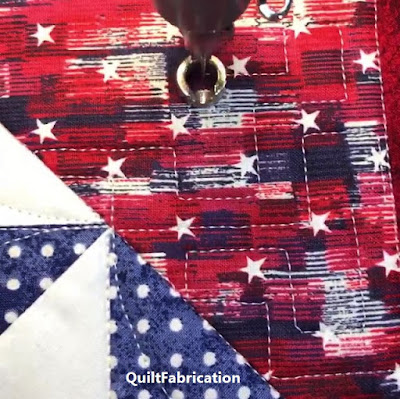Don't those wedges look like a cool, refreshing treat for this hot weather???
How about a little tutorial on making a watermelon wedge? Then enjoy them all summer long!
Watermelon Flesh
The flesh is the red part of the wedge, full of juicy goodness! I like my watermelon flesh red, as it's usually sweeter, and because this is quilting, I also like it scrappy - the more variety of reds, the better!Grab 13 2.5" red squares, laying them out in two rows of four, then a row of three, and at the bottom, a row of two.
Add in some seeds by first marking selected squares (see further below for which ones) 1" on the top, and 1.75" on the side.
Then stitch a seed triangle, diagonally cut from a black 1.25" x 2.25" rectangle, from mark to mark on the red square. Press toward black, and trim out the excess.
The bottom row has 1 seed, the 2nd row, 2 seeds in the opposite direction, and the third row has 3 seeds in the same direction at the bottom row.
Notice there's several squares stacked. I like to make many wedges at one time, completing each step for multiple wedges before moving to the next step. Just saves time!
Once the seeds are in, stitch rows together, pressing away from the seeds, alternating direction between rows.
Then stitch those rows together, lining up the seam of the bottom row with the middle of row 2, and lining up the center seam of row 3 with the middle of row 2. This is important for trimming later.
The watermelon flesh is finished - time to move on to the rind.
Watermelon Rind
White Rind
Watermelon flesh tends to turn pale in color at the rind, and is often shown as white in drawings. I chose to do the same here, adding the white rind portion in three parts to shape the top of the wedge.Trim the right side of the flesh from seam to seam, leaving a .25" seam allowance.
Stitch on the first rind piece, a white .75" strip. Press.
The white ends up being pretty narrow, same as if in a real watermelon.
Then measure .375" from the top, marking a line. Place the next strip, another .75" white piece, on the line and stitch in place. Don't trim anything yet!
Press, and trim the left side, again from center seam to side edge seam leaving a .25" seam allowance.
Now trim away the excess behind the center piece, and stitch another .75" white strip to the left.
Trim away all the overhangs for a nice shaped top, ready for the green rind portion.
Green Rind
On the left, stitch a 1.25" green strip. Press. Trim the green even with the white strip at the center. Do not trim anything along the outer edge.Add on a 1.25" green strip along the top. Press. Trim the green even with the white strip on the right.
Finally, add a 1.25" green strip to the left. Press and trim the remaining green edges even with the other rind parts. The unit measures approximately 9" tall.
Watermelon Wedge
To turn this unit into a mouth-watering watermelon wedge, it needs two final cuts. There's two ways to do this, either with a Hex n More ruler (affiliate link), or a 6" x 12" ruler (affiliate link).
If using a Hex n More, mark a center line with a piece of tape. Then line that up with the center seams on the watermelon flesh, leaving .25" at the tip for a seam allowance.
If using a 6" x 12" ruler, line up the 30 degree line with the watermelon flesh center seams, again leaving a .25" seam allowance at the tip. Trim, and repeat for the other side.
And look at those freshly cut watermelon wedges, ready for any project! I've had so much fun making these, that I have two projects using them. I'll have a table runner to show on Friday, and a big quilt to show next week.
Both will have patterns available, as they are very different. Each pattern includes more detail on watermelon wedge construction than what I've given here, plus making them into blocks. Until then, enjoy every bit of this refreshing summer fruit!!
Happy Quilting!
















































